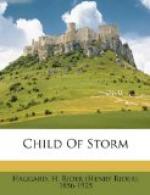There he stood, rolling his eyes and hugging his kaross around him because of the cold, and something in his anxious, indeterminate expression told me at once that he knew himself to be a man in terrible danger. Just behind him, dark and brooding, his arms folded on his breast, his eyes fixed upon the ground, looking, to my moved imagination, like an evil genius, stood the stately and graceful Saduko. On his left was a young and sturdy white man carrying a rifle and smoking a pipe, whom I guessed to be John Dunn, a gentleman whom, as it chanced, I had never met, while behind were a force of Natal Government Zulus, clad in some kind of uniform and armed with guns, and with them a number of natives, also from Natal—“kraal Kafirs,” who carried stabbing assegais. One of these led John Dunn’s horse.
Of those Government men there may have been thirty or forty, and of the “kraal Kafirs” anything between two and three hundred.
I shook Umbelazi’s hand and gave him good-day.
“That is an ill day upon which no sun shines, O Macumazana,” he answered—words that struck me as ominous. Then he introduced me to John Dunn, who seemed glad to meet another white man. Next, not knowing what to say, I asked the exact object of their visit, whereon Dunn began to talk. He said that he had been sent over on the previous afternoon by Captain Walmsley, who was an officer of the Natal Government stationed across the border, to try to make peace between the Zulu factions, but that when he spoke of peace one of Umbelazi’s brothers—I think it was Mantantashiya—had mocked at him, saying that they were quite strong enough to cope with the Usutu—that was Cetewayo’s party. Also, he added, that when he suggested that the thousands of women and children and the cattle should be got across the Tugela drift during the previous night into safety in Natal, Mantantashiya would not listen, and Umbelazi being absent, seeking the aid of the Natal Government, he could do nothing.
“Quem Deus vult perdere prius dementat” [whom God wishes to destroy, He first makes mad], quoted I to myself beneath my breath. This was one of the Latin tags that my old father, who was a scholar, had taught me, and at that moment it came back to my mind. But as I suspected that John Dunn knew no Latin, I only said aloud:
“What an infernal fool!” (We were talking in English.) “Can’t you get Umbelazi to do it now?” (I meant, to send the women and children across the river.)
“I fear it is too late, Mr. Quatermain,” he answered. “The Usutu are in sight. Look for yourself.” And he handed me a telescope which he had with him.
I climbed on to some rocks and scanned the plain in front of us, from which just then a puff of wind rolled away the mist. It was black with advancing men! As yet they were a considerable distance away—quite two miles, I should think—and coming on very slowly in a great half-moon with thin horns and a deep breast; but a ray from the sun glittered upon their countless spears. It seemed to me that there must be quite twenty or thirty thousand of them in this breast, which was in three divisions, commanded, as I learned afterwards, by Cetewayo, Uzimela, and by a young Boer named Groening.




